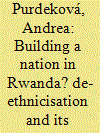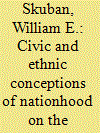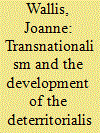| Srl | Item |
| 1 |
ID:
085159


|
|
|
|
|
| Publication |
2008.
|
| Summary/Abstract |
Rwanda remains in the eastern camp of ethnic ideas and projects of a 'nation' inasmuch as it is dominated by cultural as opposed to civic/political elements. Although the Rwandan attempt remains exclusive internally, it does not affirm the validity of an idealised Kohnian dichotomy between 'exclusive' ethnic nationalism and 'inclusive' civic nationalism. To avoid the trap of a bi-polar and value-ladden division, while preserving the useful insights of Kohn, the paper calls for a re-conceptualisation of nation-building projects along the continuum of their relative inclusiveness/exclusiveness, both internally (who shapes the 'idea of nation') and externally (the boundaries of nation).
|
|
|
|
|
|
|
|
|
|
|
|
|
|
|
|
| 2 |
ID:
085168


|
|
|
|
|
| Publication |
2008.
|
| Summary/Abstract |
External forces are often seen as a source of the break-up of Czechoslovakia before World War II. This paper, however, argues that no less significant were the tensions between Czechs and Germans. One of the Czech thinkers who saw the fragility of Czechoslovakia was Emanuel Rádl. The author examines Rádl's concepts of nation and nationality, and introduces his idea of the contractual state. The author criticises certain incongruities in Rádl's theoretical suggestions. Nevertheless, she finds prescient Rádl's vision that the solution of the relation between Czechs and Germans would affect the entire Central European region.
|
|
|
|
|
|
|
|
|
|
|
|
|
|
|
|
| 3 |
ID:
085148


|
|
|
|
|
| Publication |
2008.
|
| Summary/Abstract |
Using Hans Kohn's classic distinction between the Western, political, or civic model of nationalism, and the Eastern, genealogical, or ethnic model, this article analyses the process of nationalism during perhaps the most contentious border dispute in South American history: the Peruvian-Chilean frontier after the War of the Pacific (1879-1883). This article argues that while Kohn's modular dichotomy remains analytically useful in isolating the principles arbitrarily used by Chilean and Peruvian political elites in their official national projects, it underestimates the ways in which various sectors of local society responded to, rejected, or renegotiated these projects.
|
|
|
|
|
|
|
|
|
|
|
|
|
|
|
|
| 4 |
ID:
085161


|
|
|
|
|
| Publication |
2008.
|
| Summary/Abstract |
The Danish cartoon controversy raises questions about the inclusiveness of Western European civic nationalism. The controversy highlighted a harsh, exclusivist brand of Danish civic nationalism that cast Muslim migrants as outsiders. The controversy also saw a broader group of cartoon supporters from across Europe fault Muslims for failing to respect liberal traditions of freedom of speech and secularism, traditions now explicitly labeled 'European'. However, others pushed the debate in a more open direction by defending the Jyllands Posten's freedom of expression in ethnically neutral terms and explicitly challenging the contrast between an enlightened Europe and an intolerant Muslim other
|
|
|
|
|
|
|
|
|
|
|
|
|
|
|
|
| 5 |
ID:
085169


|
|
|
|
|
| Publication |
2008.
|
| Summary/Abstract |
While the question of how to integrate Romani communities has increased in political significance since the 1990s, a consensus has yet to be reached on how best to design integration policies for such a heterogeneous group of people. This article examines debates on whether ethnoculturally specific or neutral policies are more appropriate. Using the Czech Romani integration policy as a case study, it identifies as a significant problem the conflation of the Romani ethnic identity with the low socio-economic status of many (but not all) Roma. This has led to a policy focus on programmes to tackle social deprivation rather than addressing the discrimination which affects all Roma regardless of class. As a consequence of the decentralisation of power in the Czech Republic and the ingrained nature of anti-Romani prejudice, policies, whether ethnoculturally neutral or specific, will be implemented or rejected at the local level on the basis of local priorities.
|
|
|
|
|
|
|
|
|
|
|
|
|
|
|
|
| 6 |
ID:
085155


|
|
|
|
|
| Publication |
2008.
|
| Summary/Abstract |
This paper analyses the role of Rajasthan Vanvasi Kalyan Parishad (RVKP), an ethnic Hindu(tva) organisation, among the tribal populations in south Rajasthan. It argues that the RVKP has been able to enhance its legitimacy and expand its socio-political support base among the tribals through a well-articulated and planned process of 'ethnification'. This process has been carried out in four basic ways: (1) utilising development projects as means to spread the ideology of Hindutva, (2) bringing religious awakening and organising mass re-conversion programmes, (3) redefining indigenous identity and characterising certain communities as 'the other', and (4) with the support of the various state institutions. The paper concludes that by ethnicising indigenous identity, the RVKP has not just created a 'culture of fear and violence' in the tribal regions but also threatened the secular democratic ethos of Indian society
|
|
|
|
|
|
|
|
|
|
|
|
|
|
|
|
| 7 |
ID:
085152


|
|
|
|
|
| Publication |
2008.
|
| Summary/Abstract |
The present article endeavours to analyse the use and scope of Western positivistic legal tools in the creation of the Nepali nation. It suggests a two-level analysis. First, a historical analysis of Nepal's political and legal developments is presented to investigate the rationale of using law as a social engineering and homogenising tool promoting an identifiably Nepali national identity. Second, the article focuses on the current debates concerning constitutional change in Nepal. The debates about the demise of the 1990 Constitution in 2007, and the election of a Constituent Assembly need to be investigated in the light of the growing politicisation of ethnicity in the country. The overarching demand for inclusion stems from the discontent of Nepal's ethno-linguistic, religious, and regional minorities with their historical subordination. Ultimately, the article aims to demonstrate that the Nepali experience is situated somewhere between the civic and ethnic models of nationalism Kohn enunciated.
|
|
|
|
|
|
|
|
|
|
|
|
|
|
|
|
| 8 |
ID:
085164


|
|
|
|
|
| Publication |
2008.
|
| Summary/Abstract |
This article discusses Hans Kohn's argument that civic nations pay little attention to cultural claims in their definition and practice of citizenship, by looking at the political system in France and its relation to culture. Contrary to Kohn's analysis, culture has played - and still plays - a fundamental role in the definition and modus vivendi of the civic republic in France, through a form of cultural nationalism implemented by the state. It is also argued that the opposition between civic and ethno-cultural nations can be misguided. Indeed the French civic nation can be conceived of as 'cultural' while rejecting ethnicity in its definition of citizenship. This calls for the redefinition of Kohn's dichotomy and mismatch between culture and ethnicity.
|
|
|
|
|
|
|
|
|
|
|
|
|
|
|
|
| 9 |
ID:
085166


|
|
|
|
|
| Publication |
2008.
|
| Summary/Abstract |
This article challenges the common distinction between a Western and an Eastern type of nationalism with regard to Russian nationalism. Analysing the civic nationalism of the Decembrists and the cultural nationalism of the Slavophiles, it argues that the type of nationalism that appears in a specific country has more to do with timing than with place or social conditions. The article also suggests that intellectual thought should be studied in an international rather than a national context and that the world of ideas has to be granted a considerable degree of autonomy from socioeconomic conditions.
|
|
|
|
|
|
|
|
|
|
|
|
|
|
|
|
| 10 |
ID:
085157


|
|
|
|
|
| Publication |
2008.
|
| Summary/Abstract |
By analysing the symbols and language employed in official statements on two cases of ethnic minority unrest in Iran in 2005-6, the article shows how the Islamic Republic's ideologues and leaders are responding to threats against national security and to alternative definitions of identity. In this emerging discourse, religious and secular notions of patriotism and loyalty are interwoven and an Islamist/nationalist conceptualisation of Iranian nationhood is defended. This interesting process of paradoxical dynamics is an important part of the ongoing struggle to define the identity of Iran in a region boiling with political and cultural conflicts.
|
|
|
|
|
|
|
|
|
|
|
|
|
|
|
|
| 11 |
ID:
085151


|
|
|
|
|
| Publication |
2008.
|
| Summary/Abstract |
The Kingdom of Tonga is commonly referred to as a 'small island developing state', and is consequently said to experience challenges that hinder its development. Yet significant levels of Tongan migration - and subsequent remittances - have led commentators to challenge this pessimistic view. In particular, Tonga has been characterised as a 'deterritorialised nation-state', whereby the 'state' remains the geographically bounded territory of Tonga; while the 'nation-state' consists of all Tongans, including those overseas. This article seeks to build on previous literature to provide a detailed consideration of how the deterritorialised Tongan nation-state works in relation to the different dimensions of Tongan life.
|
|
|
|
|
|
|
|
|
|
|
|
|
|
|
|